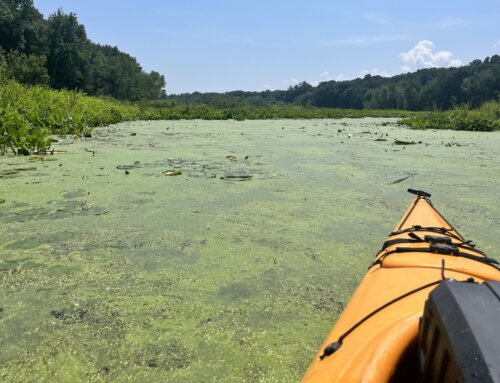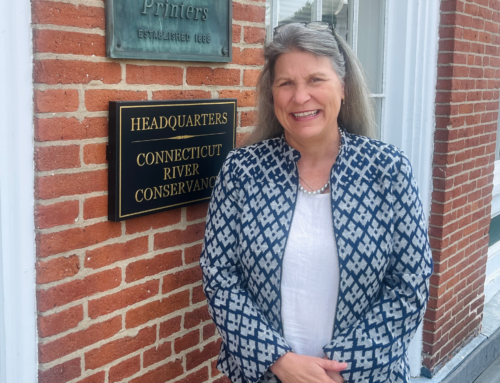FOR IMMEDIATE RELEASE
Chickley River Dredging Halted by State
Watershed Council Praises Action
Greenfield, MA – December 2, 2011 – The Connecticut River Watershed Council (CRC) today praised the state’s decision to shut down further post-flood work on the Chickley River in Hawley and to order the contractor to repair the environmental damage it caused. The action came after the environmental group submitted a letter documenting the damage and asking the Massachusetts Department of Environmental Protection (DEP) to take action.
While the group was pleased that DEP enforced the state’s environmental laws it also questioned why the agency had not inspected the site until CRC and other state agencies sounded the alarm.
“It’s really clear that the straightening and dredging of the Chickley for several miles went far, far beyond what was necessary to repair and protect roads, bridges and private property and apparently residents were complaining weeks or months ago,” said Andrea Donlon, CRC’s River Steward for Massachusetts.
“Not only did the work harm wildlife and habitats, it likely increases risk next spring or in any future flooding.”
The Chickley River, a tributary of the Deerfield River, drains hilly topography some 10-15 miles west of Greenfield. The Chickley is regulated as a cold water fishery, is home to two state endangered aquatic species, and is annually stocked with Atlantic salmon fry each spring. In late August, Tropical Storm Irene dumped more than 10 inches of rain in the region, causing flooding of the Chickley and destroying portions of Route 8A and other nearby roads so badly that supplies had to be air-lifted to Hawley residents right after the storm.
To facilitate recovery efforts, the state temporarily amended its environmental protection laws to allow emergency work to be done without the usual permitting and public notice. Work falling under the temporary regulations was meant to minimize impacts and be focused solely on repairing and protecting infrastructure and property.
In addition to the work done to rebuild and protect roadways, the work done in Hawley included straightening, digging deeper, rip-rapping the river, and building gravel berms on both shorelines through wooded areas far from any infrastructure. After both the CRC and Trout Unlimited raised questions, the DEP, the MA Dept. of Fish and Game, and the Natural Heritage and Endangered Species Program conducted site visits.
Contractor for the work in Hawley was E.T. & L. Corp. of Stow, MA. According to the findings in the DEP order, when the company was interviewed by DEP on November 15th, they said they had not read any documents regarding what work was permitted.
On November 22, NHESP sent the town a notice of non-compliance with the Massachusetts Endangered Species Act. On November 29, DEP revoked the town’s emergency certification, and the following day ordered E.T & L. Corp. to stop all work. The state is also requiring the company to repair the damage it caused. DEP’s order requires the company to hire an environmental engineer to evaluate the river and develop a plan to address the harm to fish and wildlife, the loss of floodplains and floodways, and risk to public safety, and then to go back and repair the damage to the extent possible.
Penalties for not complying with the order can go up to $25,000.
The Watershed Council said it will ask to review the plan created by E.T. & L’s environmental engineer and has informally asked DEP to do a compliance inspection of the Cold River in Florida along Route 2 because that work is also being done by E.T. & L.
“In most cases,” Donlon said, “towns took necessary action to recover from this catastrophic flooding. It is not clear why such extensive work was executed in Hawley and who is paying for it. Rivers need to bend and dissipate energy from the water. Boulders and woody debris provide habitat for living organisms in the water.
“A 4-5 mile stretch of some of the state’s best cold water habitat has been ruined. Obviously, what’s done is done. But it’s our hope that moving forward the DEP understands that there needs to be better communication and oversight to avoid this kind of environmental tragedy in the future.”
# # #
CONTACT:
Richard Ewald, Planning & Development Director; rewald@ctriver.org; 413-772-2020 ext. 206
Andrea Donlon, River Steward (MA); adonlon@ctriver.org; 413-772-2020 ext. 205
Based in Greenfield, the Connecticut River Watershed Council works to improve water quality and native fisheries in the Connecticut River’s 11,000-square mile watershed in the four states of Massachusetts, Connecticut, New Hampshire and Vermont. Through its web site and publications – such as the popular Connecticut River Boating Guide – the nearly 60-year-old non-profit organization promotes conservation, recreation, and a sensible balance between the needs of human and natural communities. ctriver.org







